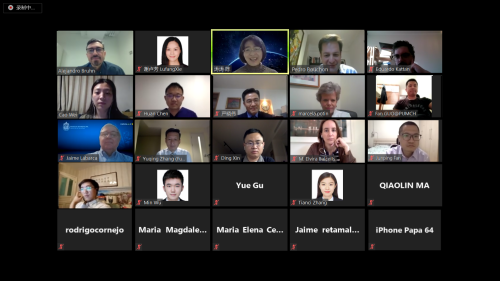may 7, 2020
on the evening of may 5, 2020, beijing time, the exchange conference of chinese and chilean medical experts on "covid-19 intensive care" was successfully held by online video connection. the conference was co-organized by tsinghua university latin america center and pontifical catholic university of chile (puc).
the topic of covid-19 intensive care was expanded from the positive and effective results of the last exchange meeting held by two parties on april 23, which was addressed to the topic of covid-19 diagnosis.
a total of 28 people attended the meeting, including experts from the peking union medical college hospital's (pumch) aid team in hubei, experts from the chinese academy of medical sciences, and chilean experts in areas of critical care and epidemiology. the meeting was co-hosted by yan xiaowei from pumch, chief physician of department of cardiology, and pedro buchon, vice president of puc. yan xiaowei introduced the participating chinese experts. they were cao wei, deputy chief physician of the department of infectious diseases, chen huan and ding xin, attending physicians in critical care medicine, fan junping, attending physician in respiratory and critical care, and guo fan, a specialist in cardiology. xiao meng, an assistant researcher in the laboratory, all of the above are from pumch, and zhang yuqing, a professor of cardiology from fuwai hospital.
"the experience they have gathered is a treasure of china, and i believe it is also a treasure of the world. i sincerely hope that their valuable experience will benefit our chilean friends." chen taotao, director of tsinghua university latin america center, said in the opening speech of the conference. she mentioned that most of the chinese experts participating in the meeting today came from pumch, which organized and dispatched a multidisciplinary medical aid team to wuhan during the epidemic. at that time, they risked their lives to take care of covid-19 patients in wuhan without any vaccine or any effective medications. they are the heroes of the chinese people.

china-chile medical experts online video-communication
work together to defeat the epidemic
chen huan, the attending physician in area of intensive care medicine from pumch, gave chilean counterparts a detailed introduction to intensive care of covid-19 based on his experience. he said that so far, there are no specific medications for covid-19 treatment. the main protection strategies are mechanical ventilation, extracorporeal membrane oxygenation (ecmo) or other mechanical support, anticoagulation, etc., these are used to protect the lungs, heart, brain, liver and other organs of patients. he emphasized that supportive therapy is very important, including anticoagulation therapy, intravenous immunoglobulin, nutrients intake and glycemic control. in terms of critical care personnel, chen huan said that in order to avoid excessive physical exhaustion of medical staff, the practice was that doctors took shifts every 6 hours, nurses every 4 hours, and took a break every 2 days. in addition, all doctors and nurses of the medical team were required to participate a series of training courses every night.
"although we are facing a new virus and lack treatment experience and specific medications, as long as all mankind is closely united, we believe that with the strength of team, professionals and empathy for patients, we all work together, a new model will be created, and we will have a great victory in the fight against the epidemic!" chen huan finally said.
new confirmed cases in chile have increased significantly, intensive care faces challenges
alejandro bruhn, director of the department of intensive care at the faculty of medicine of puc, introduced the current situation in chile, such as the adopted prevention policies, the methods of intensive care, and the challenges faced in intensive care. he presented that the total number of confirmed cases in chile, according to the latest data, is 20,643, the number of deaths is 270, accounting for 1.3% of the total number of confirmed cases. the number of new confirmed cases per day has been between 300-500lately, until the sudden increase 4 or 5 days ago. the main reason is that the government changed the testing criterion and reduced the isolation area. at present, there are 30% of icu wards available in chile, and half of the patients who use ventilators are patients of covid-19. he believes that the main challenges currently in the intensive care in chile are the shortage of personal protective equipment for medical staff, the urgent need to increase medical staff training, the urgent need to further improve the ability of intensive treatment, and the recent increase in critical ill patients may lead to saturation of icu beds and physical exhaustion of icu medical staff for long hours working.
after the introduction, the conference entered the q&a session. experts from both sides further exchanged and discussed on prone ventilation, convalescent plasma program, discharge criteria and other aspects.
china faces new problems of epidemic control
at the end of the meeting, zhang yuqing, vice president of the hypertension committee of china international exchange and promotion association for medical and healthcare, also professor of cardiology from fuwai hospital, cams & pumc, said that we faced a difficult situation some time ago, but now the situation in china is getting better. currently, we confront a new problem, how to control the epidemic. for this we have done a series of studies and have found some solutions. at present, more and more people in chile are getting tested and more will get effective treatment. i think this is good. hope everything in chile will be better and you will win the final victory.
china has set an example in the crisis of covid-19
pedro buchon, vice president of puc, said in his closing speech that he is grateful to chinese experts for sharing their valuable experience, which is very practical and valuable to chile. chile and china are currently at different phases of the epidemic. china has achieved success in this crisis and set a good example. we can formulate some measures based on your successful experience.



